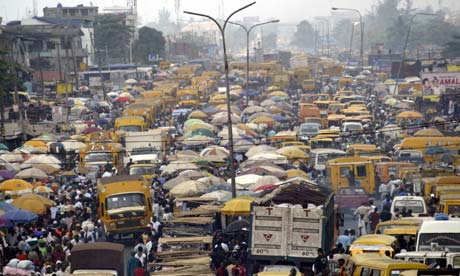There's no one way to suddenly cut carbon emissions, but better family planning where it's most needed is a cost-effective start

On October 31, according to forecasts, the 7 billionth person will be born. A few weeks before this milestone, Adnan Mevic, whom the United Nations declared Baby 6 Billion in 1999, celebrated one of his own. He turned 12.
More than 200,000 people are added to the population each day, and we're expected to keep growing for years to come, reaching anywhere from 8 billion to 11 billion mid-century.
The idea of living sustainably, of "going green", has recently become a buzzword when talking about everything from energy to water to agriculture. We certify energy-efficient LEED buildings. We build electric cars. We invest in solar power. But in terms of our own numbers, we are anything but sustainable.
Of course, consumption is a big part of the problem. With less than 5% of the world's population, the US consumes about one-fifth of the world's energy. We're among the top countries in the world in terms of per-capita emissions, and the average American is responsible for about 200 times as much carbon as the average Ethiopian.
But it's the poorest areas of the world, those least responsible for the generation of greenhouse gases, that are disproportionately feeling the effects of climate change.
Over-exploitation and habitat loss as a result of population pressures is also accelerating the extinction of plant and animal species, undermining the poor in parts of the world where people are heavily dependent on nature for livelihoods. Areas of rapid population growth overlay those with high numbers of threatened and vulnerable plant species, and much of the coming growth is expected to take place in the tropics, where ecosystems harbour the planet's richest forms of biodiversity.
Responding to climate change and protecting plant and animal species requires integrated solutions from governments, businesses and advocates. We need to reduce land-based pollution and stop destructive fishing practices that weaken coral reefs. We need land use reforms, government incentives for developing biofuels and alternative energy sources, and education. However, doing any of that without also making efforts to slow population growth makes an uphill climb even more difficult.
It's unpopular to apply sustainability to the concept of population growth, as the word "population" evokes worries about state control and limits on reproductive freedom. But slower population growth can not only lessen vulnerability to climate change impacts, it also has the potential to significantly reduce future greenhouse gas emissions. Following a slower population growth path could reduce fossil fuel emissions by an extra 1.1 billion tonnes of carbon per year by 2050.
About half of those reductions would come from fertility decline in the United States and developing countries, and could be achieved simply through meeting existing demand for family planning services. More than 200 million women in developing countries want to avoid pregnancy, but need modern contraception. The emissions reductions that could be expected through meeting these family planning needs would be roughly equivalent to the reductions that would come from ending all tropical deforestation.
Compared with the technological investments needed to reduce greenhouse gas emissions globally, the cost of meeting the current demand for family planning is cheap. Emissions averted through investments in family planning would cost about $4.50 per tonne of carbon dioxide, compared with options such as solar power ($30 per tonne) or carbon capture and storage from new coal plants ($60 per tonne).
Every human being has a right to a certain quality of life, which is harder to achieve with growing population. Human numbers are central to a achieving a sustainable future. As we celebrate the birth of the 7 billionth child, we should also make investments now to improve his or her future.
• Thomas Lovejoy is a conservation biologist who coined the term "biological diversity". He currently holds the Biodiversity Chair at the Heinz Center for Science, Economics, and the Environment based in Washington, DC, and serves on the Board of Directors for Population Action International.

No comments:
Post a Comment